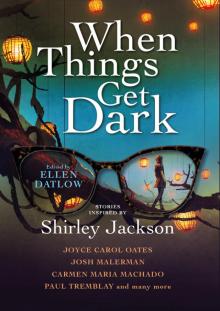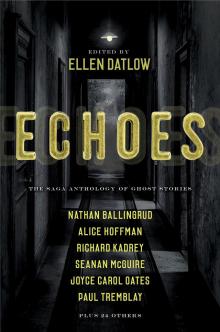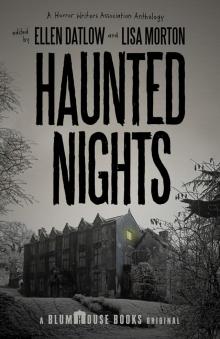- Home
- Ellen Datlow
When Things Get Dark
When Things Get Dark Read online
Contents
Cover
Also available from Titan Books
Title Page
Leave us a Review
Copyright
Dedication
Introduction
Funeral Birds | M. Rickert
For Sale By Owner | Elizabeth Hand
In the Deep Woods; The Light is Different There | Seanan McGuire
A Hundred Miles and a Mile | Carmen Maria Machado
Quiet Dead Things | Cassandra Khaw
Something Like Living Creatures | John Langan
Money of the Dead | Karen Heuler
Hag | Benjamin Percy
Take Me, I Am Free | Joyce Carol Oates
A Trip to Paris | Richard Kadrey
The Party | Paul Tremblay
Refinery Road | Stephen Graham Jones
The Door in the Fence | Jeffrey Ford
Pear of Anguish | Gemma Files
Special Meal | Josh Malerman
Sooner or Later, Your Wife Will Drive Home | Genevieve Valentine
Tiptoe | Laird Barron
Skinder’s Veil | Kelly Link
Acknowledgments
About the Authors
About the Editor
ALSO AVAILABLE FROM TITAN BOOKS
A Universe of Wishes: A We Need Diverse Books Anthology
Cursed: An Anthology
Dark Cities: All-New Masterpieces of Urban Terror
Dead Letters: An Anthology of the Undelivered, the Missing, the Returned…
Dead Man’s Hand: An Anthology of the Weird West
Exit Wounds
Hex Life
Infinite Stars
Infinite Stars: Dark Frontiers
Invisible Blood
Daggers Drawn
New Fears: New Horror Stories by Masters of the Genre
New Fears 2: Brand New Horror Stories by Masters of the Macabre
Out of the Ruins: The Apocalyptic Anthology
Phantoms: Haunting Tales from the Masters of the Genre
Rogues
Vampires Never Get Old
Wastelands: Stories of the Apocalypse
Wastelands 2: More Stories of the Apocalypse
Wastelands: The New Apocalypse
Wonderland: An Anthology
Escape Pod: The Science Fiction Anthology
Dark Detectives: An Anthology of Supernatural Mysteries
LEAVE US A REVIEW
We hope you enjoy this book – if you did we would really appreciate it if you can write a short review. Your ratings really make a difference for the authors, helping the books you love reach more people.
You can rate this book, or leave a short review here:
Amazon.com,
Amazon.co.uk,
Goodreads,
Barnes & Noble,
Waterstones,
or your preferred retailer.
When Things Get Dark
Hardback edition ISBN: 9781789097153
E-book edition ISBN: 9781789097160
Published by Titan Books
A division of Titan Publishing Group Ltd
144 Southwark Street, London SE1 0UP
www.titanbooks.com
First edition: September 2021
10 9 8 7 6 5 4 3 2 1
This is a work of fiction. All of the characters, organizations, and events portrayed in this novel are either products of the author’s imagination or are used fictitiously. Any resemblance to actual persons, living or dead (except for satirical purposes), is entirely coincidental.
Introduction © Ellen Datlow 2021
Funeral Birds © M. Rickert 2021
For Sale By Owner © Elizabeth Hand 2021
In the Deep Woods; The Light is Different There © Seanan McGuire 2021
A Hundred Miles and a Mile © Carmen Maria Machado 2021
Quiet Dead Things © Cassandra Khaw 2021
Something Like Living Creatures © John Langan 2021
Money of the Dead © Karen Heuler 2021
Hag © Benjamin Percy 2021
Take Me, I Am Free © Joyce Carol Oates 2021
A Trip to Paris © Richard Kadrey 2021
The Party © Paul Tremblay 2021
Refinery Road © Stephen Graham Jones 2021
The Door in the Fence © Jeffrey Ford 2021
Pear of Anguish © Gemma Files 2021
Special Meal © Josh Malerman 2021
Sooner or Later, Your Wife Will Drive Home © Genevieve Valentine 2021
Tiptoe © Laird Barron 2021
Skinder’s Veil © Kelly Link 2021
The authors assert the moral right to be identified as the author of their work.
No part of this publication may be reproduced, stored in a retrieval system, or transmitted, in any form or by any means without the prior written permission of the publisher, nor be otherwise circulated in any form of binding or cover other than that in which it is published and without a similar condition being imposed on the subsequent purchaser.
A CIP catalogue record for this title is available from the British Library.
This book is for my mother, Doris Leibowitz
Datlow, who let me read whatever I chose
to while growing up. Thanks, mom.
Introduction
I’VE been a fan of Shirley Jackson’s work since I read We Have Always Lived in the Castle as a pre-teen. My appreciation of her uncanny fiction perfectly dovetailed with my love of Ray Bradbury, Harlan Ellison, and so many other writers of weird, fantastic, and horrific literature.
July 2019, I attended Readercon, a literary sf/f convention outside of Boston, and got into a discussion about literary influences. Because the Shirley Jackson Awards are given out at Readercon, Jackson’s name of course came up, and it occurred to me to edit an anthology of stories influenced by her work—but I never followed through.
Until… a few months later, I met a Titan editor at the World Science Fiction convention in Dublin. Although our initial conversation was about anthologies in general, by November—out of the blue—he and his colleagues suggested I edit an anthology of stories influenced by Jackson. So of course I said yes.
I’ve come to realize that Jackson’s influence has filtered—consciously or subconsciously—into the work of many contemporary fantasy, dark fantasy, and horror writers. Some more obviously than others, so they were the writers I initially approached for submissions. Then other writers, writers I would not have pegged as being influenced by her, surprised me with their interest in contributing to such a book.
What is a Shirley Jackson story? She wrote the charming fictionalized memoir Life Among the Savage, a series of collected stories originally published in women’s magazines about her family, living in domestic chaos in rural Vermont. But what sticks in most readers’ minds today is her uncanny work such as “The Lottery,” The Haunting of Hill House, and We Have Always Lived in the Castle. The brilliant 1963 movie The Haunting, based on The Haunting of Hill House, brought Jackson a whole new audience.
Her stories, mostly taking place in mid-twentieth-century America, are filled with hauntings, dysfunctional families and domestic pain; simmering rage, loneliness, suspicion of outsiders; sibling rivalry and women trapped psychologically and/or by the supernatural. They explore the dark undercurrent of suburban life during that time period.
For this anthology, I did not want stories riffing on Jackson’s own. I did not want stories about her or her life. What I wanted was for the contributors to distill the essence of Jackson’s work into their own work, to reflect her sensibility. To embrace the strange and the dark underneath placid exteriors. There’s a comfort in ritual and rules, even while those rules may constrict the self so much that those who must follow them can slip into ma
dness.
To, as Jackson said, “use fear, to take it and comprehend it and make it work.”
And this is what the contributors have done.
Some of the stories herein take place—or end up—in that most domestic of rooms, the dining room, and they center on meals.
Others feature uncanny encounters with ghosts or the inexplicable: misfits finding comfort in one another despite the inevitable destruction their relationship engenders on themselves and others outside their circle of safety; family members turning on each other; women trapped by expectations; people punished for being outside the norm.
So here for your enjoyment are stories that I believe provide the flavor of some of Shirley Jackson’s best fiction. And I would like to think that Jackson, were she still alive, might recognize and appreciate what she birthed.
Funeral Birds
M. Rickert
LENORE had carefully chosen what to wear but felt dissatisfied. She always wanted to be a woman who appeared chic and vaguely kick-ass in black when, in fact, she looked like a half-plucked crow. She reached back to pull down the difficult zipper then drew the dress overhead, momentarily trapped, inhaling the unpleasant scent of her body odor until, with a gasp, she was free, her hair risen in static revolt as she spun on her stockinged feet to the closet. Panic rising, she reached for the hibiscus dress, but what would they think about a woman who arrived late to a funeral in luau attire? She chose the periwinkle instead. The elastic around the waist had grown tight in recent years and the out-of-date Peter Pan collar was much too young for her, but she loved the pattern of demure blue flowers scattered across a cream background. It had been the first thing she bought after her husband died all those years ago. When she wore it she liked to imagine someone had thrown flowers in celebration of her independence, as a counterpoint to the ridiculous rice that had marked the wedding and caused a bird to peck at her head as if trying to drill some sense into her.
Wondering if she would ever like herself again, she fixed her lipstick, brushed her hair, and slipped into the black heels she’d purchased special for the occasion, hoping that, in the right light, they might look dark blue. She dumped the contents from the black purse into her everyday bag. It was beige with brown trim, a gold clasp, and very serviceable. When she finally left, ten minutes later than targeted, she told herself everything would be all right.
“You. Can. Do. This,” she said in the car, flicking the radio on and almost ruining everything by arriving with her windows down, Van Halen blaring loud enough for several mourners standing at the church door to turn around and look.
* * *
It wasn’t until after the long service (why did Lenore always forget how Catholics droned on?) when the priest stepped in front of the altar to relay the family’s invitation to the congregation that she remembered the tuna casserole forgotten in her refrigerator. Under other circumstances this mistake might have caused her to feel defeated, but by that point her spirit was quite elevated. Lenore hadn’t realized how much she dreaded seeing the casket until she discovered there was none. A simple wooden crate the size of a tissue box rested on a pedestal in the nave. Delores had been cremated.
One of Lenore’s favorite things about funerals was the gathering afterward, sometimes spent in church basements but often at a relative’s house, eating potato salad and pickles and pastries all off the same plate. She enjoyed finding a quiet place to sit, listening to the murmured voices, pretending it was her house, and her suffering. The usual price of admission for such solace was attendance at the burial, but Delores’s daughter had other plans for her mother’s ashes, which suited Lenore just fine.
The daughter’s house was a brick bungalow with a suspiciously tidy garden, likely managed by a landscaper. Lenore sat in the car for a few minutes, watching, but while an occasional person arrived with a covered dish or casserole, many did not. She used the rearview mirror to examine her lips, which always failed to please under close inspection. What was it Delores had said? “You don’t look like someone who could keep a secret,” and then Lenore had said, “Well, neither do you.”
“I can keep a secret,” Lenore whispered to the hot air in the car. She was never sure what happened after death, but suspected it wasn’t the end of everything. “I hope you know,” she added, just in case, “friendship never dies.”
She opened the car door, sucking in the fresh air like a person coming out of sedation. She did not lock it. Anyone could tell it wasn’t necessary in that neighborhood; besides, people would be coming and going for a while, though, coincidentally, she walked alone up to the house, the click of her heels like the tap of an insistent woodpecker ricocheting off the trees, picket fence, and stone walls of suburbia.
* * *
When she stepped from the dark foyer through the cozy living room populated by mourners into the dining room with its resplendent spread of glistening strawberries and green salad in glass bowls, assorted cheeses and chocolate cake arranged on pretty china atop a lace tablecloth, Delores’s daughter (wearing a figure-flattering dress the color of eggplant) stopped in mid-sentence, eyes wide, to gasp Lenore’s name, and she was sure she’d made a terrible mistake, misjudged the situation entirely, but the woman walked over to grasp the hands Lenore extended in defensive reflex.
“I’m so glad you came. I want to thank you for everything you did for my mother.”
“Jane,” Lenore began, embarrassed. Clearly others were listening but pretending they weren’t, the conversational hum reduced to a false tenor.
“Jean.”
“I’m sorry.”
Jean was one of those close talkers, moving in so near to Lenore she worried about her own breath and the onions in her morning omelet.
“I heard you’d been at the church. I hoped you would come.”
Lenore glanced away from Jean’s earnest blue eyes (quite like her mother’s) to survey the room. Who? Who reported her attendance? She didn’t know any of these people. Only one stunning woman with severely dark hair and brutal red lips was dressed in black and, judging by how well it suited her, probably owned no other color. No, it wasn’t the fact that Lenore hadn’t worn the funeral dress that set her apart. It was something else. An aspect she recognized from other occasions but never knew how to remedy. The others looked like they lived in the same country where she was merely a tourist.
“It gives me such comfort to know she had you as a nurse.”
“Home health care aid,” Lenore said, squeezing Jean’s hands slightly, which prompted release.
“Excuse me?”
“I’m not a nurse.”
Jean cocked her head slightly.
Like a bird with a worm, Lenore thought. “I’m sorry,” she began, interrupted by a large woman who reminded her of Julia Child stepping between them to offer condolences. After a few awkward moments of being ignored, Lenore backed away to pick up a plate from the table she strived to circle with an air of polite engagement. In reality, she felt a holiday level of excitement at all the food before her, pleased she’d forgotten the tuna casserole, which would have looked out of place, like cat food amongst the splendor.
Lenore, paper plate in one hand and wine glass in the other, meandered through the living room, a small TV room, and a very nice kitchen remodeled in silver and white, almost blinding after all the wood. She was just about to perch on the window seat, vacated as she watched, when she noticed another door, down a narrow hallway past the bathroom. The closed door did not suggest invitation but Lenore was not deterred. After all, she was used to breaching private spaces in her work.
An office: desk and chair faced into the room framed by a large window, the kind with glass panes divided by wood as throughout the rest of the house, though this was probably modern. A little addition, Lenore guessed; nicely done.
She set plate and wine glass on a table beside the large upholstered chair in the corner. There were many lovely elements in the room. A lamp with Tiffany-inspired shade, a large rai
nbow-colored paperweight on the desk (which Lenore intended to investigate once she finished eating), a few baubles on the shelves propped in front of the books: a blue glass bird, a shape carved in wood—vaguely suggestive of the female form—a rock.
The hydrangeas in bloom beyond the window had attracted several butterflies and Lenore found herself torn, while she ate, between staring dreamily at them or studying the cozy furnishings around her when the door suddenly opened and the daughter stepped into the room, her features—in profile—sharp. Lenore made a little clearing-throat noise and Jean turned, hand over her heart.
“My God,” she said.
“Sorry,” said Lenore. “I just—”
“Oh, no need to apologize.” Jean swatted the air. “I didn’t realize you were in here. These are such tedious events. I’m sure you attend far too many.”
“Well…” Lenore decided not to explain. The truth was she rarely went to the funerals. Delores was special.
“Actually,” Jean said, “this might be divine intervention. Do you believe in that sort of thing?”
Lenore shrugged. She’d learned long ago it was best not to engage in theological speculation. Jean, not bothering to wait for an answer, walked over to the only other chair in the room. It was on wheels, yet difficult to maneuver through the tight space between desk and wall. Watching her struggle, Lenore wondered if she should offer to help, annoyed to think of having to do so on her day off. At just that moment, however, Jean managed to free the chair, which she pushed across the carpet to position in front of Lenore, successfully blocking her only avenue of escape.
“I was hoping we could talk.”
Lenore, who had the wine glass poised at her lips, took a long last gulp, thereby covering much of her expression, buying a little time to think before she set the glass on the table, then picked it up to place a napkin there as a coaster though she saw a ring had already formed. She hated how easily she ruined everything and, turning to face Jean, fully expected to be confronted with a scowl. But the woman lifted her hands as if to reach across the space between them, though they simply hovered in the air before landing in her lap like baby birds unaccustomed to flight.

 Inferno
Inferno The Best of the Best Horror of the Year
The Best of the Best Horror of the Year When Things Get Dark
When Things Get Dark A Whisper of Blood
A Whisper of Blood Echoes
Echoes Blood Is Not Enough
Blood Is Not Enough Haunted Nights
Haunted Nights The Best Horror of the Year Volume Eleven
The Best Horror of the Year Volume Eleven The Green Man
The Green Man The Dark
The Dark Mad Hatters and March Hares
Mad Hatters and March Hares Nebula Awards Showcase 2009
Nebula Awards Showcase 2009 The Devil and the Deep
The Devil and the Deep